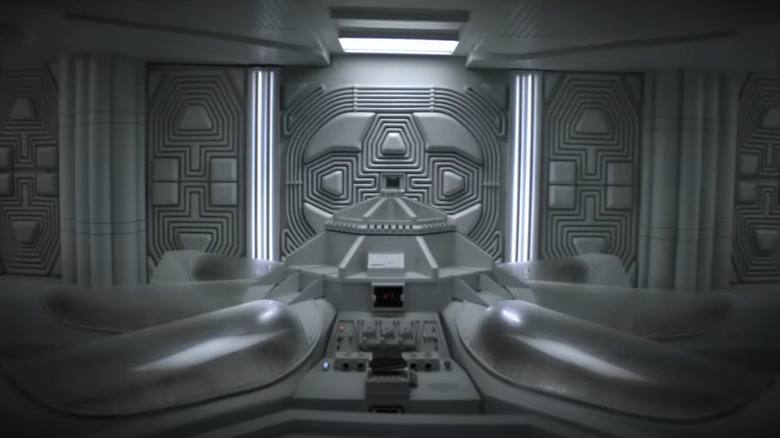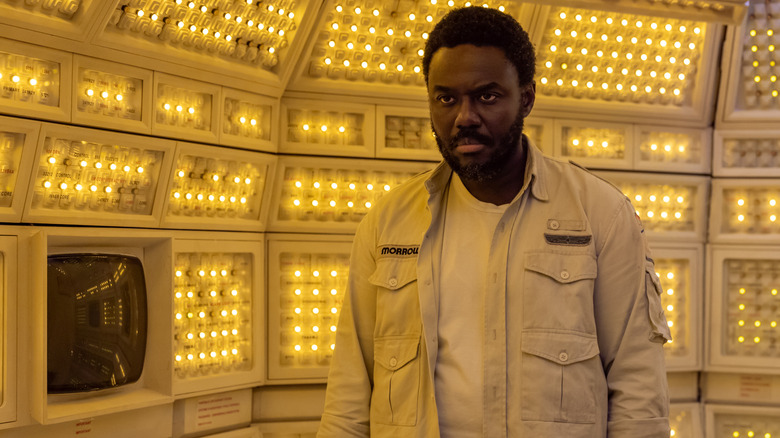One Of Alien: Earth's Most Important Decisions Makes No Sense
Warning: This article contains spoilers for the first two episodes of "Alien: Earth."
In a fitting development for this particular franchise, the idea of individuality remains at the forefront of "Alien: Earth" throughout its first two episodes. Creator Noah Hawley's FX series stands out as the first instance of the property migrating from the big screen to streaming television, but it's also the latest instance of an "auteur" (for lack of a better word) trying their hand at this material and injecting their own sense of style ... for the most part, at least. As /Film's Chris Evangelista wrote in his review, almost every prior film brought something fresh and new to the picture. The first six movies couldn't possibly be more different from one another, boldly holding the line against modern blockbuster mindsets that prioritize self-referential storylines and aesthetics above all else.
That's what makes it all the more disappointing that, for an IP always about innovation over imitation, "Alien: Earth" falls into that trap with one of its most important decisions in the early going. When the premiere starts, we're treated to essentially a remake of the opening of Ridley Scott's classic 1979 "Alien." A spaceship gliding through vacuum next to a ringed planet alone would've been enough, easing us into a brand-new story about the Xenomorph (and other critters) crash-landing on Earth through the use of a little nostalgia. But then comes several establishing shots of familiar-looking rooms completely devoid of humans, an exact replica of the cryo-sleep chamber with the crew waking up just as they did in the original, and (most egregiously of all) a shot-for-shot recreation of the breakfast scene full of the exact same overlapping crosstalk.
As tiresome as this is from a legacy sequel perspective, however, it adds insult to injury that the entire structure of this sequence makes little logical sense.
Alien: Earth prioritizes nostalgia over narrative consistency
When does reverence for a classic turn into slavish devotion? "Alien: Earth" tests the limits of that boundary right from the outset, throwing viewers headfirst into this prequel series by defaulting to the most famous and familiar imagery of the entire franchise. We quickly zoom into the interior of the USCSS Maginot, described as a Weyland-Yutani vessel that we soon learn is meant for deep-space research. The crew complement is made up of blue-collar workers (along with one fairly standoffish Synthetic) and they're all eager to list their gripes with the company. This all makes sense for a show made by a diehard fan of the first movie, not too dissimilar from an avid "Star Wars" fan like J.J. Abrams more or less turning "The Force Awakens" into a feature-length homage to "A New Hope."
Where this falls apart, however, is in the actual narrative logic of what "Alien: Earth" is trying to achieve compared to "Alien." The Nostromo spaceship that provides the setting of the 1979 film was a mining ship, of course, owned by Weyland-Yutani but explicitly designed for freight hauling. The fact that its greasy and gritty personnel end up tangled up with the terrifying Xenomorph plotline is entirely circumstantial (in terms of the plot) — in an ideal version of the movie, they never would've ended up crossing paths with the LV-426 planetoid and instead would've gone along their merry space-mining way. So why on Earth (or off Earth, rather) would a ship like the Maginot, made for exploration and research in deep space, also share the same exact aesthetics as the Nostromo?
There's nothing inherently wrong with nostalgia, in and of itself, but it certainly becomes a bigger problem when it begins to distract from — or worse, outright contradict — the larger story being told.
Alien: Earth should've taken its cues from two very different Ridley Scott movies: Prometheus and Alien: Covenant
To be fair to "Alien: Earth," it makes a certain amount of sense that this production out of any other would ape the style and tone of "Alien." It's set only two years before the events of "Alien," and there's certainly a thematic argument to be made that a corporation as cold and soulless as Weyland-Yutani would mass produce their starships — regardless of their actual purpose. After all, what better way to emphasize the traditional franchise idea of capitalism grinding humanity to the bone until there's nothing left than by applying a one-size-fits-all approach to their vast, cosmic empire? In another, better version of this show, the writing team could've been making this exact piece of commentary. Yet based on the first two episodes of the series, there's little supporting evidence that this is actually the case.
What's most frustrating is that Ridley Scott, of all people, already showed us the way forward with his "Prometheus" and "Alien: Covenant" prequels. The two movies drew plenty of fandom ire for diverging so blatantly from the established tone and visuals of the originals, if you remember, but that was entirely the point. Scott decided to use the safety of blockbuster franchising to tell a very different story about high-minded ideas of the origins of our species, the human ego, and the devastating consequences of uncontrolled ambition. To reflect that, he populated these films (but especially "Prometheus") with very specific characters — not the equivalent of space-truckers, as "Alien" so memorably focuses on, but scientific minds over-reliant on glossy technology and the comforts of the rich. Gone are the dank, Lovecraftian hallways of the Nostromo and LV-426, replaced by the artificially clean and sterile confines of state-of-the-art spacecraft.
Scott understood that different functional needs require a different formalist approach, but the same can't be said for "Alien: Earth" — at least in the early episodes. There's still plenty of time for the rest of the season to change hearts and minds, winning over even the biggest skeptics. New episodes of "Alien: Earth" stream on FX and Hulu every Tuesday.


